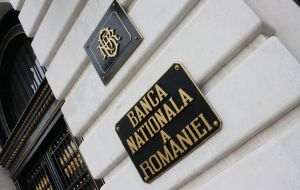The Euro rose constantly last week against the leu, from 4.4484 lei/Euro on Monday, October 3rd, to 4.4949 lei/euro - on Friday, October 7.
On one hand, the recent strengthening of the Euro reflects the evolution on the international markets, especially the weakening of the pound sterling following the escalation of the Brexit talks, said Ionuţ Dumitru, the president of the Fiscal Council, who added that on the other hand, the evolution of the Euro/leu exchange rate is also based on local factors, such as the talks concerning the law of forex denominated loans, which can lead to the weakening of the leu.
Mr. Dumitru told us: "There has been a combination of factors. On one hand, on the international markets there have been some developments that led to the deterioration of sentiment concerning emerging markets, and I am talking here about the talks tied to the Brexit, which have intensified. In this context, the pound sterling has fallen to historic lows as well".
Last week, the pound sterling weakened against the dollar on the international markets, reaching a 31-year low, as investors are worried that Great Britain's exit from the European Union (Brexit) will restrict the United Kingdom's access to the single market.
Tied to the conversion of foreign loans, the debates on the matter have started again lately, with deputies in the legal and budget commission set to debate the draft law today.
If the MPs reach a consensus and vote on the legislative initiative of PSD deputy Ana Birchall, then the draft law may be included on tomorrow's agenda of the joint meeting of the two chambers of the Parliament.
Deputies have currently agreed that they will go with the conversion at the historic exchange rate of CHF-denominated loans, which are the ones that have caused the most trouble to borrowers, after the exchange rate for the CHF blew up at the end of last year.
The exchange rate of the Swiss franc rose last week from 4.0764 lei (Monday) to 4.1160 lei (Friday), according to NBR data.
Liberal deputy Daniel Cătălin Zamfir claims that this wouldn't be the first time when the National Bank of Romania uses pressure before a vote on a law that concerns the banking system.
He told us: "The exchange rate rose significantly before the law of giving in payment. This is not the first time when the NBR uses this kind of methods, when it uses pressure just before a vote on a law that concerns the banking system. This is the same manipulation technique through which it is attempting to scare the population and the Parliament by announcing disasters".
In turn, economic analyst Lucian Isar says: "The euro/leu exchange rate is not freely floating, rather it is manipulated, managed by the National Bank of Romania. The NBR drives the exchange rate, allows it to move for various purposes. When electoral campaigns get near, these induced moves of the exchange rate are there to persuade the public and politicians of the impact that the tools the NBR has at its disposal have on the minds of the voters. Other times, the moves induced on the exchange rate are simply gifts for those who trade on margin".
Economist Aurelian Dochia, member on the Board of Directors of BRD - Groupe Societe Generale, thinks that the evolution of the Euro was caused by the manifestation of animosity on the currency markets, unfavorable to emerging countries, as he told us.
He told us: "There is no clear explanation, but I think that we are talking about some nervousness among currency market investors. This nervousness makes investors very eager to protect themselves from all kinds of risks and, whenever there is this animosity and aversion to risk, currencies of emerging countries are the ones that suffer, because there is a migration towards stronger currencies".
The Euro hasn't passed the 4.4900 lei threshold since July this year.























































